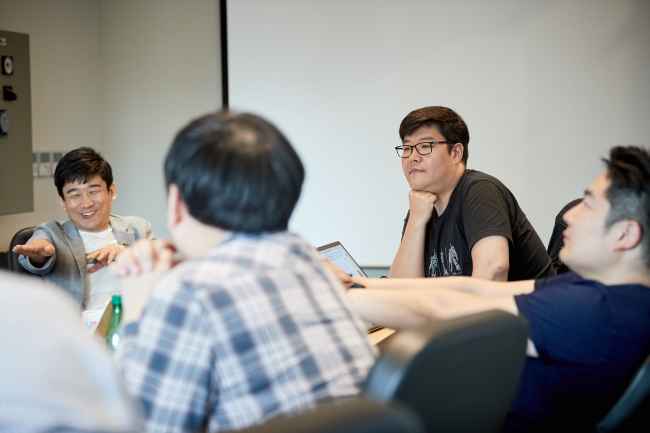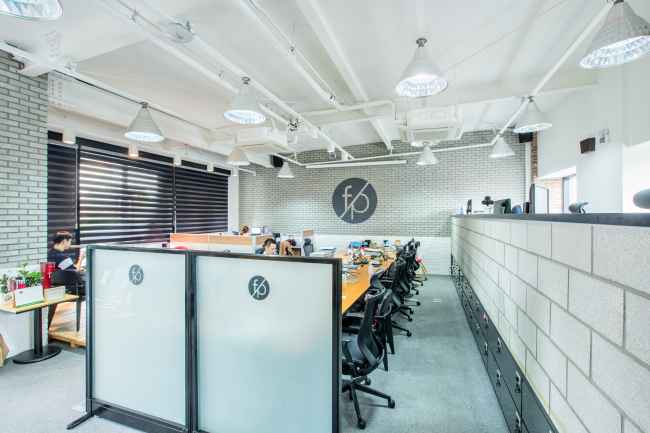Startups
[INTERVIEW] Futureplay, a tech-savvy startup accelerator in Korea
[THE INVESTOR] Futureplay, one of the nation’s most influential startup accelerators, has offered funding and mentorship for about 60 tech firms since its establishment in 2014. They include: Bitfinder, the company behind the Awair air quality monitor that attracted US$4.5 million Series A funding from multiple investors, including Samsung Ventures; Luxrobo, a robot module maker that received US$3.5 million funding from Kakao; and Bagel Labs, a Kickstarter startup that develops a smart tape measure, called Bagel.
 |
Junghee Ryu (second from right) |
CEO Junghee Ryu, 44, a KAIST graduate, founded the firm two years after he sold his own facial recognition technology startup Olaworks to US chip giant Intel for 35 billion won (US$31 million) in 2012. It was the first case of a Korean venture firm being purchased by a foreign company.
Ryu stresses the firm’s specialty in picking up early-stage startups and nurturing them into attractive global players, boasting that his management team comprises tech-savvy specialists -- CTO Jason Han, a KAIST graduate; CCO Hwang Sung-jae, also a KAIST graduate who owns more than 100 patents in Korea and the US; Jung Ho-seok, a lawyer; and Danny Yoon, a patent attorney.
“Korean tech startups will thrive in the next couple of years,” Ryu told The Investor, saying graduates from top elite schools in Korea and abroad are flocking to the startup scene and local tech giants such as Samsung LG -- their potential clients -- who used to prefer partnership with foreign firms are now willing to work with home-grown startups.
Futureplay more recently is expanding partnerships with local conglomerates such as LG Electronics and Amorepacific that are increasingly paying attention to incubating startups. “We want to play a buffer role between startups and big tech firms to reduce risks for both,” he added.
The following are excerpts of a recent interview with the Futureplay CEO at the firm’s Seoul head office.
Q: Futureplay is a leading startup accelerator specialized in tech firms. What’s your specialty?
A: Futureplay is not a typical startup accelerator that focuses on picking up promising startups. Of course, we are known for being picky when choosing a startup we want to invest in. But our focus is not who they are now but what they will become in the future.
We pour more resources into bringing their potential. In addition to seed-stage funding, we operate a six-month intensive incubation program called TechUP. Even after that, our specialists continue to offer support, including technological advice and networking opportunities.
Q: Have there been any failed investments?
A: Sure. Of some 60 firms, one-third may be in danger of going bankrupt. We can fail but that’s the beauty of this business.
Q: What’s the competitiveness of Korean startups?
A: Tech startups, among others, definitely have an edge over their foreign rivals. The founders are graduates from top elite schools in Korea or abroad who can compete head-on with global talents. They are starting business on the home turf of Samsung and LG, their potential clients.
Investors are also paying attention to Korean startups for the same reasons. There is no cultural barrier for lucrative technologies. A recent trend is maintaining an R&D team in Korea while setting up a marketing branch in Silicon Valley if necessary.
 |
Futureplay Seoul office |
Q: Why do you think big Korean firms such as Samsung and LG rarely invest in Korean startups?
A: There may be several reasons. They used to prefer teaming up with foreign firms for global recognition. They still face heightened scrutiny when they try to acquire or invest in smaller firms in Korea.
But I believe if a startup, regardless of its nationality, is attractive enough, there is no reason for Samsung not to pour money in it. It is just recently that even Samsung has started Silicon Valley-style startup funding.
Q: You seem to be increasingly working with big firms such as LG Electronics and Amorepacific. Any comments?
A: We want to play a buffer role between startups and big firms who are interested in investing in startups. It is extremely difficult for early-stage startups to find investors, while big firms do not have resources to verify their technologies still in their initial phase.
We are carrying out several projects to reduce the risks for both.
Q: What is your outlook for the Korean startup scene?
A: More dynamics will occur in the next couple of years. The government used to lead the nation’s startup scene, including regulations. But more recently the atmosphere is changing. More early-stage startups will have increasing opportunities.
Q: What’s your next interest in the tech sector?
A: Two things -- cryptocurrency and brain science. They are still in their early stages but we have already started searching for related startups. The so-called fourth industrial revolution technologies such as AI and VR are no longer new to me. It’s regrettable that the government’s policy, including funding programs, focuses on the current trends only, not on the future.
We will continue to bet big on early-stage startups. That may be riskier but have higher returns. My confidence comes from our talented team.
By Lee Ji-yoon (jylee@heraldcorp.com)








